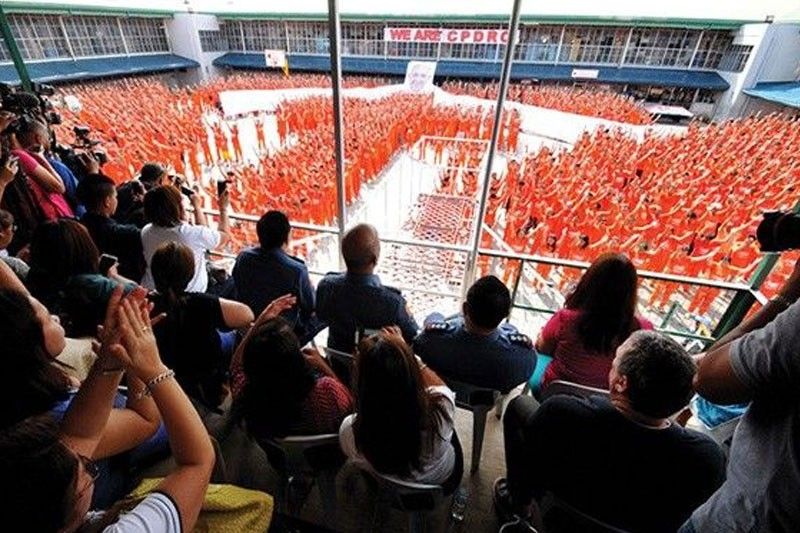Jail sans parole

CEBU, Philippines — Amid furor over heinous crime convicts getting out of prison early under the Good Conduct Time Allowance (GCTA) law, Congress should consider passing new legislation that would give trial courts the leeway to render “life sentences without parole” to extremely ruthless criminals, said Cebu Representative Eduardo Gullas.
Gullas said that America, for one, has more than 50,000 convicts currently serving life without parole and are never getting out of prison. He believes a similar penalty is can be of use in the Philippines.
"The severe punishment is as good as locking up a convict and throwing away the key,” Gullas said.
Gullas made the statement amid the public outcry over the early release of heinous crime convicts due to “ambiguities” in the GCTA law and allegations that loopholes in the 2013 law have enabled corrupt prison officials to “sell” allowances to convicts.
"Clearly, there are violent and dangerous criminals who should be incarcerated for the rest of their natural lives to satisfy the demands of justice and to protect the general public. Thus, the option of life sentence without parole,” Gullas said.
At present, under the Revised Penal Code, the maximum penalty for convicted criminals is reclusion perpetua or 30 to 40 years in prison. The convict is also eligible for possible conditional early release after 15 to 20 years.
Gullas, meanwhile, confirmed Cagayan de Oro City Rep. Rufus Rodriguez’s previous statement that it was the Senate’s idea in the 15th Congress to increase the Revised Penal Code’s GCTA for convicts.
“But there’s really no point in finger-pointing now, because ultimately the GCTA Law was an act of Congress. So the entire Congress has to accept responsibility for any lack of clarity in the law,” Gullas said.
Just the same, Gullas explained that in the 15th Congress, House Bill 417 simply proposed that time spent during “preventive imprisonment” be counted as part of the offender’s overall time served after conviction and sentencing – the standard practice in most of the modern world.
Preventive imprisonment basically refers to time spent in detention while the accused is still facing trial in court or prior to conviction and sentencing in cases on non-bailable offenses.
Gullas said, however, that when HB 417 reached the Senate, the upper house pushed for and incorporated the increase in the GCTA for convicts.
“The House at the time had to go along with the proposal of the Senate in order to get the combined measure approved,” Gullas said.
HB 417 was authored by then Aurora Rep. and now Sen. Juan Edgardo Angara and Rodriguez. Gullas and six other House members co-authored the bill.
One more surrender
In a related development, another convict released under the GCTA turned himself over to authorities in Cebu last Saturday afternoon.
Seventy-year-old Virgilio Banzon of Barangay Tayud, Consolacion surrendered to the Consolacion Police and has been turned over to the Criminal Investigation and Detection Group (CIDG).
Banzon was convicted for double murder and frustrated murder on February 28, 1996 and was released last October 26, 2018. He was around 40 years old when he committed the crime.
He said he never requested to be considered for a GCTA release. He believes that he was considered because of his clean behavior at the Bilibid prisons.
“Gani, nalipay man gani ko sa dihang gitawagan ko nga makalaya nako kay wala man gyud ko magdahom kay wala ko magsulat… nagpaabot lang ko kung kanus-a ko nila pagawason, muna nga dako kaayo akong kalipay (I was happy when I was called and informed that I would be freed because I did not expect it, I did not apply for it… I was just waiting to be released so I was very happy),” he told The Freeman.
Outside of prison, he reportedly spent his time trying to live a normal life by tending to the garden and animals at his sister’s property in Consolacion where he lived.
He reportedly lived alone because he never heard from his children after his wife died in 2014. He said his family never visited him in jail and he never met any of them when he was released.
Now, he will be back in the company of convicts.
“Siyempre, naguol gyud ko kay sa 29 nako ka-tuig didto sa New Bilibid Prison, nagtinarong gyud kog maayo didto aron ma-earn nako ang GCTA nga insakto (I am very sad, of course, because for 29 years at the New Bilibid Prison, I behaved properly so that I can earn the GCTA),” Banzon said.
Saying that he deserves the GCTA consideration, he urged President Rodrigo Duterte to allow him to stay out of jail, even volunteering to appear before the police weekly just so he can be monitored.
“Unta iya nalang untang tugotan ba manginabuhi nga malinawon (I hope he will allow me to live peacefully),” he said.
Last week, Duterte said convicts released under the GCTA who will not surrender within 15 days will be considered fugitives. He ordered the immediate rearrest of at least 1,700 convicts freed through the GCTA law. (FREEMAN)
- Latest






















